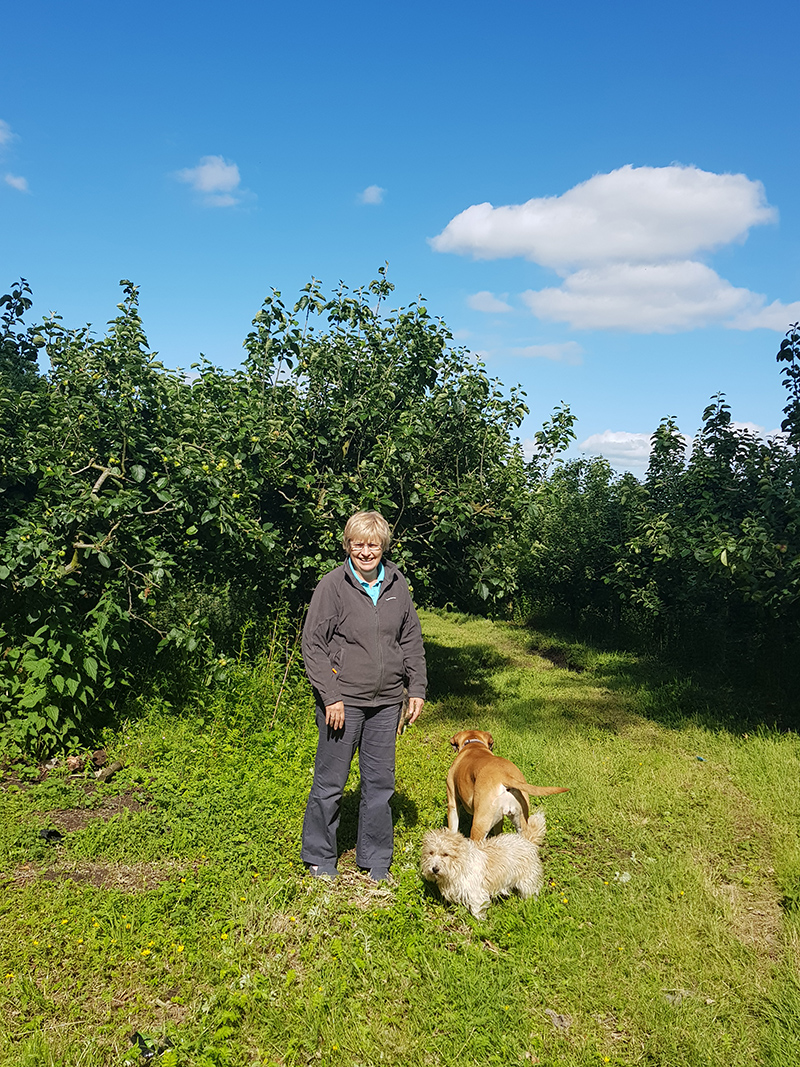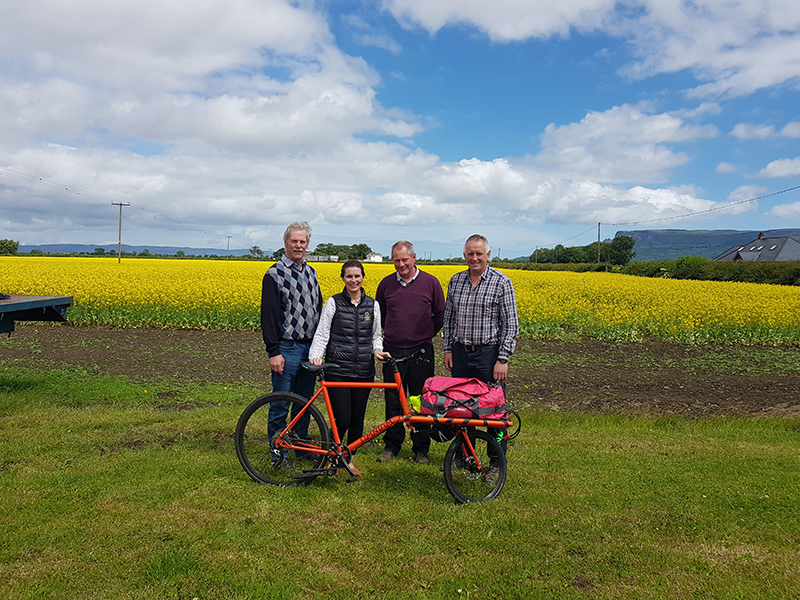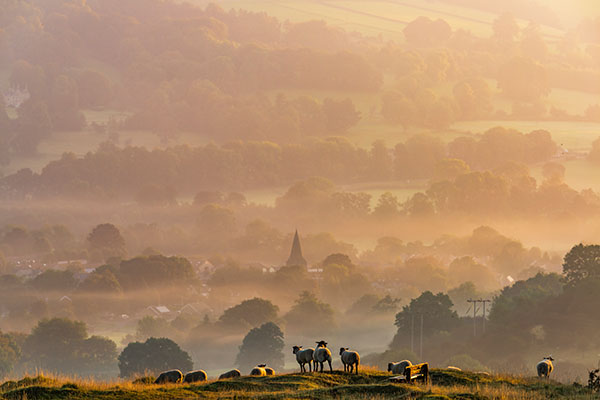Farming is a business, and can be a lucrative one for the UK’s economy – overall, agriculture contributes £24bn in revenues. However, some farmers, or producers, in Northern Ireland have been struggling to sustain their businesses, and Brexit is aggravating concerns about how to keep entire industries alive, from cattle to eel fishing.
Nowhere is the sheer complexity of Brexit more apparent than when we consider its impact on agricultural communities in Northern Ireland (N.I.). To help us make sense of this complexity, Brhmie shares the stories of producers she met while on the road for the Food, Farming and Countryside Commission.
The fallout of ‘No Deal’ for producers in N.I.
When voters had their say on Brexit, the prospect that we might fail to strike a deal with the EU wasn’t openly entertained. Pundits only began discussing the reality of reverting to the terms of the World Trade Organisation (WTO) after the Prime Minister alleged, “No deal is better than a bad deal.” However, as Helen of Armagh Cider Company argues, ‘Those who believe no deal is better than a bad deal are not earning a living from the land.” A collapse in negotiations could mean the collapse of many agricultural communities in N.I.
For Helen, the introduction of tariffs under WTO could cripple her business producing and bottling cider on her orchard, which has been in her family for five generations since 1898. Her business relies on apples and bottles crossing the border in one direction and being sent back again as cider, and as such her costs would rise significantly if high tariffs are imposed. It is unlikely that her distributors will help her shoulder these costs; she reports that some supermarkets have already warned suppliers, “Tariffs are not a legitimate reason for an increase in price.” As supermarkets wage price wars to win over each other’s customers, their suppliers struggle to get by, often obliged to sell their goods for less than the costs of production.
Helen’s cider orchard won’t be the only casualty in if no deal can be reached. An independent report for the Livestock and Meat Commission in N.I. found that under two WTO trading options, tariffs on beef and mutton would range from 40 percent to around 100 percent. Under one option, output would drop by 21%, and under the other, output would slightly increase but exports would fall by over 90%. The report concluded that WTO terms would be devastating to these farmers and advocated for membership in the single market and customs union for at least five years post-Brexit. Helen is similarly convinced that this is the only possibility if economic life is to continue.

Helen and her dogs on her orchard, which has been in her family for five generations.
The challenges faced by niche producers
Some have assumed that agreeing the right deal will be enough to reassure producers across the UK. However, in N.I. there are some toiling in industries that won’t benefit from opportunities to expand trade. Patrick of Lough Neagh Wild Eel Fishery explained that because the European eel is listed as endangered, there are restrictions on exporting outside of the EU. Trade is allowed within the EU because producers must adhere to ‘Eel Management Plans’ (EMPs), which set out strategies for replenishing the stock of wild eels. Unfortunately for Patrick and his fishermen, committing to an EMP will no longer be an option once the UK exits the EU; Lough Neagh and its clients will instead be required to draft a ‘non-detrimental findings’ (NDF) document by March 2019 to prove to CITES that are not endangering eels. However, to date, they are not aware of CITES validating a single NDF and are concerned that they may be required to cease trading within the year.
Given that the species is endangered, the logical conclusion for some may be that it is right for Lough Neagh to close. However, Lough Neagh has spent significant sums on restocking programmes, investing their own profits in addition to receiving financial support from the EU. Crucially, Lough Neagh is also a co-operative, meaning that the fishermen are united under Lough Neagh’s operation and abide by its rules in exchange for a stake. Lough Neagh has regulated what was previously a free-for-all by introducing a quota system, a cap on fishing boats, and a cap on licenses. If the co-operative were to dissolve, Patrick suspects that it would be impossible to police the waters and the result would be overfishing. To ensure the sustainability of wild eels, Lough Neagh should be permitted to carry on as it is. Yet, there is recognition that Lough Neagh is a minority interest and that the future of wild eels, those who pursue them, and this indigenous industry is far down on the list of priorities for politicians navigating Brexit.
While Patrick’s predicament may be atypical, there are countless others who are similarly facing unique challenges as a result of the referendum. For example, Helen also breeds Irish horses and notes that there are no welfare arrangements for horses at the border. Since they can move freely between north and south now, this isn’t a problem, but it would be if a hard border were to be established and customs checks increased wait times. Helen feels like this is another issue – of many – that policymakers have given little thought to and is unlikely to be addressed any time soon.
The split opinion over subsidies
A more likely priority for politicians is reforming subsidies, which will affect the majority of producers. However, not all producers feel the same way about the Common Agricultural Policy, which currently pays farmers in the EU an annual lump sum every year for each hectare they farm. Some of the producers I met at Broighter Gold believe there are fundamental problems with the current subsidy system, arguing that it has driven prices down and simultaneously raised the costs of production. Richard of Broighter Gold declared that the “industry sucks the subsidies right out of the farm”, meaning that fertiliser manufacturers, for example, set their prices according to what they believe the farmers should be able to pay given their cheques from the EU.
James and Robert, who were present on behalf of two other farms, noted that the subsidies were creating perverse incentives for weaker producers to carry on in spite of poor yields. “Subsidies are propping up inefficient farmers that are giving us a bad name.” Both were concerned about more than reputation, however, pointing out that these weaker producers were determining the overall prices of goods. For example, a farmer is still given a subsidy for growing poor quality oats, but these oats are then costed low and that price becomes the baseline for all other oats. In this sense, subsidies are ultimately hurting all producers.
Helen acknowledges that farmers shouldn’t be growing food just to get subsidies, but points out that the supermarkets have many producers up against a wall. Some products are being sold for far less than the cost of producing them. “It’s crazy that a bottle of water is more than a pint of milk.” She fears that if subsidies are cut overnight like they were in New Zealand, farms will similarly be forced to shutter. It has been estimated that CAP payments contribute to 87 percent of total farming income in N.I.
The farmers at Broighter Gold have suggested some alternatives to the current system (which will end when we leave the EU), contending that any new policy needs to be related to the cost of production. For example, subsidy could be paid on the basis of how many people the farm employs. Or, more radically, there could be a shift towards an integrated supply chain, which would mean that farmers get a direct cut of the profits that their distributors make. Robert made the case that even two percent of the price that, for example, each bag of oats sells for would be enough to replace his single farm payment.

A snapshot of the producers who assembled at Broighter Gold to discuss the implications of Brexit on their respective farms.
The Irish border question
The Irish border question can be difficult to wrestle with for anyone who hasn’t lived in or travelled to N.I. or the Republic. During the troubles, there was a hard border, which meant that anyone crossing would need to stop for customs or security checks. Since the troubles subsided, there has been a soft border, which means that crossing the border is essentially seamless. No stopping, no waiting, no examining nor explaining. Unfortunately, a hard border may crystalise again if an agreement cannot be reached to maintain the border as is after Brexit.
In the border town of Armagh in N.I., people cross the border on a weekly, or sometimes even daily, basis. They cross over to visit their bank, fill up on fuel, and frequent pubs or restaurants. Producers, who are also constantly shuttling goods back and forth for processing, make pit stops along the main road in Amargh.
The owner of a local convenience store noted the futility of trying to impose control over the border. Smuggling was rampant during the troubles when there was a hard border and its comeback is certain if it reappears. Smooth transitions from north to south and back are vital for businesses, including those of many producers. When asked about the possibility of smuggling being revived, another quipped, “You gotta get your name in early. There are already offers [for smuggling].” The ideal border for business is an open border.
Takeaways for the Commission
Many producers are already struggling under the current food and farming system. While there is potential to change this and bring about new opportunities as a result of Brexit, the dominant discourse on Brexit emphasises the importance of securing a favourable trade deal above all else. While a constructive deal is needed, of course, Brexit is raising many more issues that must be addressed with as much care and attention to detail as politicians currently spend negotiating a trade deal. The Food, Farming and Countryside Commission may be able to help navigate the complexity and set out alternatives to the current system that will renew the faith of producers in a more prosperous future.
Brhmie is a Senior Researcher in the RSA’s Economy, Enterprise and Manufacturing team.
Follow the RSA's Food Farming and Countryside Commission on Twitter and Instagram.
Related articles
-
Finding the road to renewal
Sue Pritchard
New poll by FFCC and the Food Foundation finds 85% of people want to see some of the personal or social changes they have experienced during Covid-19 continue afterwards, whilst just 9% want everything to go back to how it was before the pandemic.
-
Counting on recovery: collecting the data to inform policy post-crisis
Tom MacMillan
We’re starting to gather evidence on community responses to the pandemic, to help shape post-crisis policy. If you are too, let’s team up.
-
The Future is Here
Sue Pritchard
In a rapidly changing world, we need a stubborn optimism for the future.



Be the first to write a comment
Comments
Please login to post a comment or reply
Don't have an account? Click here to register.